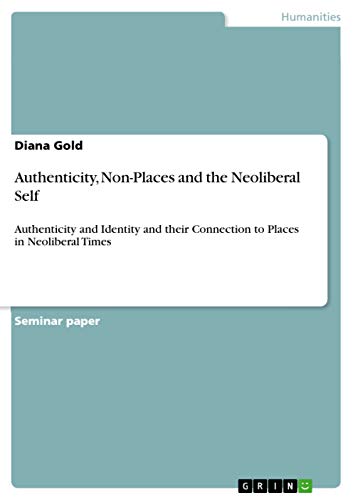Artículos relacionados a Authenticity, Non-Places and the Neoliberal Self: Authentici...
Authenticity, Non-Places and the Neoliberal Self: Authenticity and Identity and their Connection to Places in Neoliberal Times - Tapa blanda

- EditorialGRIN Verlag
- Año de publicación2018
- ISBN 10 3668813949
- ISBN 13 9783668813946
- EncuadernaciónTapa blanda
- Número de edición1
- Número de páginas20
Comprar nuevo
Ver este artículo
Gastos de envío:
EUR 23,00
De Alemania a Estados Unidos de America
Los mejores resultados en AbeBooks
Authenticity, Non-Places and the Neoliberal Self
Descripción Taschenbuch. Condición: Neu. This item is printed on demand - it takes 3-4 days longer - Neuware -Seminar paper from the year 2017 in the subject Sociology - Culture, Technology, Peoples / Nations, grade: 1, University of Vienna, language: English, abstract: When does something start to be authentic and when does it end Why is authenticity a very positively connotated word Why do tourists seek real, authentic places and people (individuals and ethnic groups) And what do they declare or accept as authentic Can something be authentic as soon as it gets commodified In my work, I would like to answer these questions by drawing on the concepts of authenticity, ethnicity, as well as, the dimensions and the paradoxes of globalization.In my opinion, authenticity is a term which suggests that something /somebody is/ has 'real' culture, history and social life, although authenticity doesn't have to be something historical. Therefore, the opposite must be something with no history and no vital social life, no individual, personal or historical relation to the place. I think these are the so called 'non-places'. According to Marc Augé these places (Non-Lieux) are producing solitude and are following the capitalistic, rationalist thinking, which leads me to the neoliberal self. Neoliberalism is not only manifested in economic terms, but also in social and cultural ones. That means that the economic changes through neoliberalistic governance, like the retreat from the welfare state, the enhancing of privatization etc. also impact individuals in their social and cultural life. Or, in other words, the macro- and micro structures are entangled and can't be divided. My questions regarding the neoliberal-self and authenticity are the following: How does neoliberalism affect the personal identity How do authenticity, ethnicity and tradition get mobilized for the neoliberal self or for city branding In this paper, I'm going to start with the explanation of authenticity and its opposite, the non-places, as contrasting concept and finally I will explain the connection of authenticity and anthropological places, as well as, non-places and the neoliberal self. 20 pp. Englisch. Nº de ref. del artículo: 9783668813946
Authenticity, Non-Places and the Neoliberal Self : Authenticity and Identity and their Connection to Places in Neoliberal Times
Descripción Taschenbuch. Condición: Neu. Druck auf Anfrage Neuware - Printed after ordering - Seminar paper from the year 2017 in the subject Sociology - Culture, Technology, Peoples / Nations, grade: 1, University of Vienna, language: English, abstract: When does something start to be authentic and when does it end Why is authenticity a very positively connotated word Why do tourists seek real, authentic places and people (individuals and ethnic groups) And what do they declare or accept as authentic Can something be authentic as soon as it gets commodified In my work, I would like to answer these questions by drawing on the concepts of authenticity, ethnicity, as well as, the dimensions and the paradoxes of globalization.In my opinion, authenticity is a term which suggests that something /somebody is/ has 'real' culture, history and social life, although authenticity doesn't have to be something historical. Therefore, the opposite must be something with no history and no vital social life, no individual, personal or historical relation to the place. I think these are the so called 'non-places'. According to Marc Augé these places (Non-Lieux) are producing solitude and are following the capitalistic, rationalist thinking, which leads me to the neoliberal self. Neoliberalism is not only manifested in economic terms, but also in social and cultural ones. That means that the economic changes through neoliberalistic governance, like the retreat from the welfare state, the enhancing of privatization etc. also impact individuals in their social and cultural life. Or, in other words, the macro- and micro structures are entangled and can't be divided. My questions regarding the neoliberal-self and authenticity are the following: How does neoliberalism affect the personal identity How do authenticity, ethnicity and tradition get mobilized for the neoliberal self or for city branding In this paper, I'm going to start with the explanation of authenticity and its opposite, the non-places, as contrasting concept and finally I will explain the connection of authenticity and anthropological places, as well as, non-places and the neoliberal self. Nº de ref. del artículo: 9783668813946

